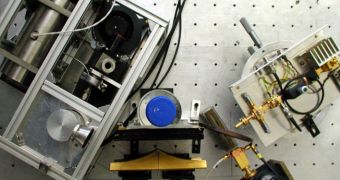Scientists at the Forschungszentrum Juelich, in Germany, announce the development of a new method of scanning liquids in airports that reduces the waiting time and is far more effective at detecting substances that may be combined to form bombs than any other existing method. If put to commercial use, the new scanner could have the beneficial effect of lifting the ban on liquids being carried into airplanes. The technology is entirely light-based, and can identify a wide array of liquids in just fractions of a second, the BBC News reports.
The German team recently published details of the new system in the latest issue of the journal Superconductor Science and Technology. The innovation also has another major advantage over other existing technologies in the fact that it can work extremely fast and with high accuracy. Other methods, such as nuclear magnetic spectroscopy, either take too long to scan the luggages, or are too expensive for large-scale implementation. The recently devised method has been dubbed Hilbert spectroscopy, and it is able to supply its operators with a firm result in just one fifth of a second.
In many research fields, the properties of materials are determined based on the way they reflect light. Each and every substance, and indeed everything in the Universe (with the exception of black holes), reflects light with a specific “signature.” Over the years, experts have compiled a massive database, containing all these signatures. So, essentially, a spectroscope needs to shine a beam of light on a sample, wait for the light to return, and then identify the patterns or signatures in it. The data is then cross-referenced to the database, and the verdict then comes out.
“No one type of spectroscopy can operate from a few gigahertz to a few terahertz [in the way] Hilbert spectroscopy [can]. [In] applications where you need high-speed operation – such as security screening – it should happen fast and in a 'broadband' [way] to make it reliable with a low number of false alarms. Hilbert spectroscopy does that,” Forschungszentrum Juelich expert Yuri Divin explains. He admits that the technique merits some improvements, but adds that its potential for security-screening uses is too large to be ignored.
“We've shown that it works, and it works well. But this is only the scientific part we have published. In commercial devices, the prototype can be used as it is or integrated with a 2D scanner,” the expert concludes.

 14 DAY TRIAL //
14 DAY TRIAL //